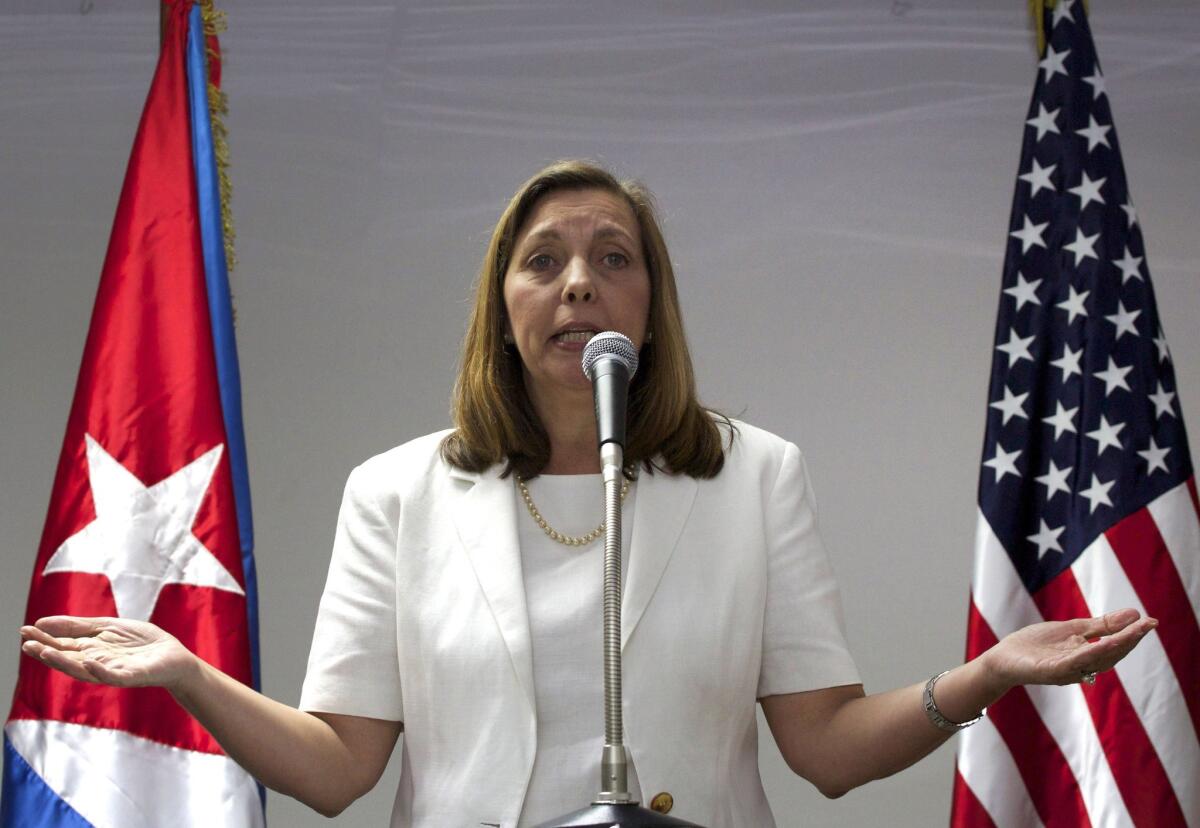Cuban and U.S. diplomats set for talks at State Department

- Share via
Reporting from Washington — A demand by Cuba to be removed from a U.S. list of state sponsors of terrorism is threatening to hold up restoration of diplomatic relations between Washington and Havana.
But senior U.S. officials said taking Cuba off the list will not be on the table when the two longtime adversaries hold talks Friday at the State Department.
Diplomats instead will focus on reopening embassies and reaching agreement on basic issues of protocol, such as the rights of diplomats assigned to the two countries to move freely, and of people to have free access to the embassies.
“There is a process between diplomats … where they’re talking about normalizing relations between our two countries and reestablishing diplomatic ties,” White House Press Secretary Josh Earnst told reporters Thursday. He said the terrorism list review “is a separate process.”
President Obama announced Dec. 17 that he would begin restoring diplomatic relations and ease trade and travel restrictions. The deal followed 18 months of secret talks with Havana that culminated in the exchange of imprisoned spies, and the release of Alan Gross, a U.S. government contractor who was imprisoned in Cuba for five years.
As part of the opening, Obama ordered the State Department to review whether Cuba should be removed from the terrorism list, which also includes Iran, Sudan and Syria. Cuba has been on the list since 1982.
The review should be completed soon, said a senior State Department official who briefed reporters Wednesday on condition she not be identified.
Even if Obama decides to take Cuba off the list, by law it cannot take effect for 45 days. That probably would push it beyond the Summit of the Americas, a gathering of Western Hemisphere leaders that Obama is planning to attend in April in Panama.
U.S. officials had hoped to restore diplomatic relations with Cuba before the summit.
“It would be very easy to restore diplomatic relations if [Cuba] would not link” it to removal from the terrorism list, said the State Department official. “That’s a delay of their own making, frankly.”
Cuba sees it the other way. Getting off the U.S. list would “create the favorable context,” to normalize relations, Gustavo Machin, a Cuban Foreign Ministry official, told reporters Wednesday in Havana.
A 2013 State Department report said Cuba’s ties to Spanish Basque rebels, to whom it long gave sanctuary, “have become more distant.” It also applauded Havana’s hosting of peace talks between the Colombian government and rebels.
But the report noted that Cuba “continued to harbor fugitives wanted in the United States.”
A decision to remove Cuba from the list would be controversial in Congress, where several key lawmakers staunchly oppose the opening to Cuba.
“The Castro regime has a long track record of providing sanctuary to terrorists and harboring U.S. fugitives who have murdered American citizens, while undermining international security,” Sen. Robert Menendez, (D-N.J.), the top Democrat on the Foreign Relations Committee, wrote Thursday in letters to Secretary of State John F. Kerry and FBI Director James B. Comey.
Menendez cited the case of Joanne Chesimard, who was convicted of killing a New Jersey state trooper in 1977 and fled to Cuba after breaking out of prison. Cuban officials have balked at returning Chesimard, a former member of the Black Liberation Army who was granted political asylum by Havana.
The talks Friday will be led by Roberta Jacobson, assistant secretary of state, and Josefina Vidal, director general of the U.S. division at Cuba’s Foreign Ministry. Jacobson and Vidal held a first round of talks last month in Havana.
Twitter: @DavidCloudLAT
More to Read
Sign up for Essential California
The most important California stories and recommendations in your inbox every morning.
You may occasionally receive promotional content from the Los Angeles Times.














